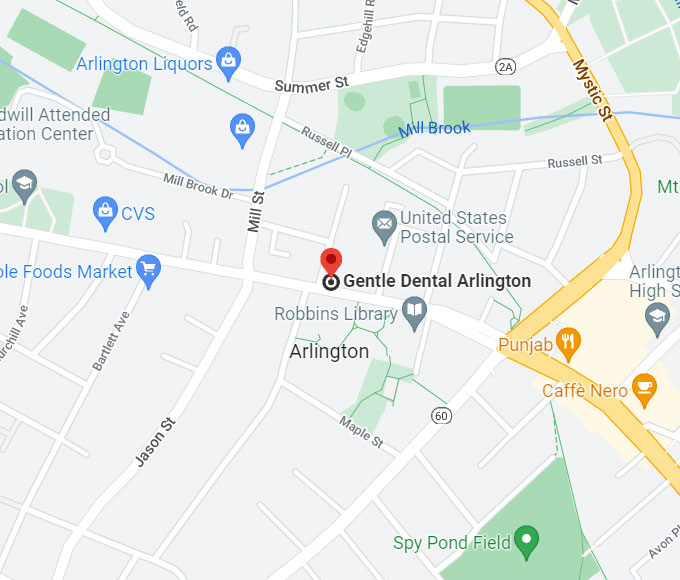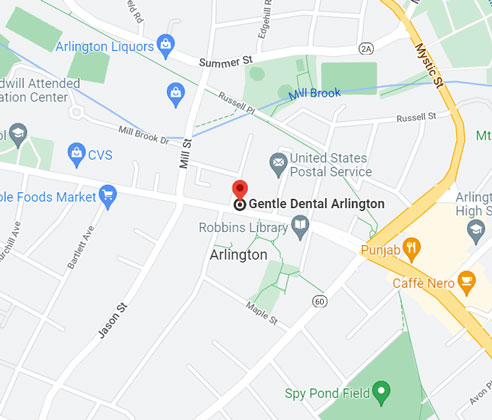- Locations
- Locations
- Arlington
- Attleboro
- Belmont
- Beverly
- Boston
- Braintree
- Brockton
- Brookline
- Burlington
- Cambridge
- Chelmsford
- Concord, NH
- Derry, NH
- East Longmeadow
- Exeter, NH
- Franklin
- Hanover
- Hudson
- Keene, NH
- Malden
- Manchester, NH
- Medford
- Methuen
- Milford
- Nashua, NH
- Natick
- New Bedford
- North Andover
- Norwood
- Peabody
- Quincy
- Raynham
- Rochester, NH
- Saugus
- Seekonk
- Somerville
- Stoughton
- Wakefield
- Waltham
- Worcester
- Dental Services

Orthodontics In Arlington
Are you seeking professional orthodontic services in Arlington? At Gentle Dental Arlington, we provide customized treatments to help straighten your teeth and enhance your smile. Book your consultation today!
Dental Office Hours
Monday 9:00 AM - 5:00 PM
Tuesday 9:00 AM - 5:00 PM
Wednesday 9:00 AM - 5:00 PM
Thursday 9:00 AM - 5:00 PM
Friday 9:00 AM - 4:00 PM
Saturday CLOSED
Sunday CLOSED
More Information
Metered, street-parking available. Can be accessed via MBTA bus, 67, 77, 79.
Dental Office Hours
Monday 9:00 AM - 5:00 PM
Tuesday 9:00 AM - 5:00 PM
Wednesday 9:00 AM - 5:00 PM
Thursday 9:00 AM - 5:00 PM
Friday 9:00 AM - 4:00 PM
Saturday CLOSED
Sunday CLOSED
More Information
Metered, street-parking available. Can be accessed via MBTA bus, 67, 77, 79.
Gentle Dental Arlington Reviews
It is always an excellent experience with Dr. Richa Bhatt. I so appreciate her expertise, her professionalism and her sincerity.
Dr. Bhatt is excellent, explains what she's seeing and all the options. I have been going there for many years and have been happy with their work. Recently, I had a cleaning where I asked to get rid of some teeth stains for a public function where I'd probably have to get pictures, and Dr. Khalil obliged, doing in one cleaning session what a month of Crest white strips apparently couldn't!
Dental Services in Arlington
Transform your smile in just one visit with professional teeth whitening in Arlington, MA, to remove years of stains from coffee, tea, and tobacco, revealing the brighter, more confident smile you deserve.Preventive Care
Preventive Care
Restorative Care
Crowns and Bridges
Dental Fillings
Extractions
Gum Treatments
Implants
Oral Surgery
Partial and Full Dentures
Root Canals
Wisdom Teeth Extractions
Orthodontics
Additional Services
What Does Orthodontics Involve?
Orthodontics is a specialized branch of dentistry that focuses on diagnosing and treating malocclusion, or "bad bites." Typical orthodontic treatments include braces, clear aligners, and retainers.
How your teeth align plays a crucial role in your overall oral health. By improving how your upper and lower teeth fit together, an orthodontist in Arlington can help reduce the risk of various oral health issues, such as cavities, gum disease, and excessive wear (erosion).
What Are Some Examples Of Orthodontic Treatments?
Depending on your specific needs, an Arlington orthodontist may recommend several types of orthodontic treatments. Some of the most common options include:
Braces
Braces gradually shift your teeth into ideal positions using brackets, bands, and wires. Different braces are available, including traditional metal and clear (ceramic) braces tailored to your preferences.
Clear Aligners
Clear aligners are a popular alternative to traditional braces. Well-known brands like Invisalign® and ClearCorrect® use a series of custom-made, clear trays to straighten your teeth. You wear each set of trays for one to two weeks, gradually moving your teeth into their correct positions.
Retainers
After completing treatment with braces or clear aligners, you'll need a retainer to maintain your teeth's new positions. A retainer is a custom oral appliance that prevents teeth from shifting back. Your Arlington orthodontist will guide you on how often to wear your retainer to keep your smile intact.
Palate Expanders
Palate expanders are often recommended during childhood when the facial bones are still developing. These devices help widen a child's upper jaw, creating more space without tooth extractions. While not every child requires a palate expander, it can be an effective solution under the right circumstances.
Consult an Arlington orthodontist to determine which treatment best achieves your desired smile.
Who Provides Orthodontic Treatment?
Orthodontists typically provide orthodontic treatment. They are specialists who complete two to three years of additional training after dental school, focusing specifically on improving your bite. Unlike general dentists, orthodontists do not perform treatments like fillings, crowns, or bridges.
Who Is Not A Candidate For Orthodontic Treatment?
To qualify for orthodontic treatment, you must have no severe dental issues, such as extensive decay or gum disease. Placing braces on teeth affected by disease can negatively impact oral health.
If you have cavities or gum disease, visiting a dentist for treatment first is best. Once these issues are addressed, consult with an orthodontist in Arlington to determine if orthodontic treatment is the right option for you.
Common Orthodontic Issues
Types of orthodontic issues include:
- Overbite: When the upper teeth protrude over the lower teeth.
- Underbite: When the lower teeth extend beyond the upper teeth.
- Overlapping teeth: When teeth overlap each other.
- Crowded teeth: When there isn't enough space for teeth to align correctly.
- Crooked teeth: Teeth that are misaligned.
- Rotated teeth: When teeth are turned or twisted in the wrong direction.
- Impacted teeth: Teeth that are partially or fully trapped in the jawbone.
An orthodontist in Arlington can help address these common problems with personalized treatment options.
Who Can Benefit From Orthodontic Treatment?
Almost everyone can benefit from orthodontic care, though some may need it more than others. Many people seek treatment from an Arlington orthodontist to enhance the appearance of their smile. Beyond cosmetic improvements, orthodontics provides better chewing function and oral health.
Frequently Asked Questions
Why is orthodontic treatment so costly?
When asked about the cost of braces, the answer is mainly influenced by the cost of materials, the number of visits required, and the follow-up appointments necessary to maintain a beautiful smile for life.
Which orthodontic treatment is the most expensive?
The critical difference with lingual braces is that they are attached to the back of the teeth, making them virtually invisible when you smile. This allows patients to maintain a confident smile throughout treatment. In most cases, lingual braces tend to be the most expensive option.
Why doesn't insurance typically cover braces?
Some dental insurance plans may not fully cover braces. They might impose age restrictions, require a waiting period, or exclude coverage for pre-existing conditions. Additionally, many plans will only cover braces if necessary to address functional issues with your teeth rather than cosmetic concerns.
What are some natural ways to align my teeth?
Maintaining Good Oral Hygiene: Proper oral hygiene can help support natural teeth alignment by preventing issues affecting your teeth' positioning.
Tongue Exercises: How you position your tongue can influence the alignment of your teeth.
Chewing Properl: Correct chewing habits can improve alignment over time.
Dietary Adjustments: Eating a balanced diet with the right foods can aid in maintaining proper teeth alignment.
Orthodontic Appliances: Using tools like retainers or aligners can help naturally guide your teeth into proper alignment.
Facial Exercises: Regular facial exercises can help strengthen the muscles that support your jaw and teeth.
Jaw Exercises: Targeted jaw exercises may help improve your teeth and jaw positioning for better alignment.
Book an Appointment
If your request is a dental emergency, or you would like to call and schedule your dental appointment, contact information for our offices can be found here: Gentle Dental Locations. New patient offer not valid for emergency appointments.

